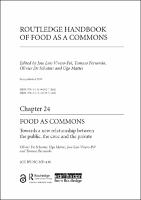Chapter 24 FOOD AS COMMONS
Proposal review
Towards a new relationship between the public, the civic and the private
Author(s)
De Schutter, Olivier
Mattei, Ugo
Vivero-Pol, Jose Luis
Ferrando, Tomaso
Language
EnglishAbstract
This book was motivated by the need to approach with a fresh look what we regard as perhaps
the most embarrassing
predicament of the Anthropocene/Capitalocene (Capra and Mattei,
2015, Altvater et al., 2016, Moore, 2017). We live in an era with roughly the same number (about
one billion) of over-fed people and of people lacking access to nutritious food (which means
that do not know in the morning if they will be able to feed themselves and their children during
the day). Our era also stands out by the remarkable amount of food that is wasted in some
parts of the world and by the unprecedented number of livestock that populates this planet
(Patel and Moore, 2017). Moreover, in the current phase of neoliberal capitalism that dominates
in the Anthropocene/Capitalocene, the ecological footprint is out of control; some rich people
(the majority in the Global North and the elite in the Global South) can enjoy every day food
shipped from thousands of miles away on gas gulping aircrafts and boats that pollute the environment
beyond imagination. Such luxury, the result of the worldwide colonization of diets,
would be impossible without a very significant environmental subsidy; if all the externalities
had to be internalized, eating Nile Perch would be unaffordable to most people everywhere.
The subsidy is ultimately paid by the poor in the South and, in general, will certainly be paid
by future generations. Unless we deal with and avoid the hidden social and environmental costs
that are so far unaccounted for in the hegemonic food system (TEEB, 2018)
Keywords
Food; commons; public; civic; privateISBN
9781138062627; 9781315161495OCN
1082957251Publisher
Taylor & FrancisPublisher website
https://taylorandfrancis.com/Publication date and place
2018Imprint
RoutledgeClassification
Technology, Engineering, Agriculture, Industrial processes


 Download
Download